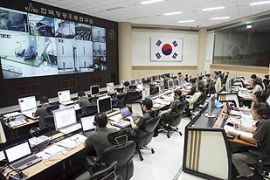South Korea aborts space launch
Seoul’s first space launch to send satellite into orbit stopped minutes before take-off.

The partly Russian-made Korea Space Launch Vehicle-1 (KSLV-1), or Naro-1, had been scheduled to lift off from the Naro Space Centre at Goheung.
Any space launch is expected to rile North Korea, which four months earlier was severely censured for launching a long-range rocket widely seen as a disguised missile test that violated UN sanctions.
The South’s $400m rocket is supposed to launch into orbit a 100kg satellite that will monitor the Earth’s radiant energy.
Tight security
Security was tight around the launch site in the province of Jeolla, about 350km south of Seoul, where about 1,600 police stood guard on Wednesday.
A squadron of fighter jets and an Aegis-class warship were deployed in the area, according to the South Korean defence ministry.
| SOUTH KOREA’S SPACE DREAMS |
|
|
The Korean Times on Tuesday had quoted Kim Jung-hyun, the South Korean vice-science minister, as saying: “We also have about 160 Russian engineers here, and should the launch be delayed, it would be difficult to reschedule”.
“The late Kim showed a great commitment to making Korea a strong nation in space technology,” he said, referring to Kim Dae-jung, the country’s former president who died on Tuesday.
“Our engineers are intent on doing the best up to the last moment to make him proud.”
South Korea aims to build a rocket completely on its own by 2018 and send a probe to orbit the moon by 2025.
It also wants to develop a commercial service to launch satellites.
“If we complete the development of the first-stage engine, we will then have the power to launch on our own,” Yoon Young-bin, an aerospace specialist at Seoul National University, said.
“This is a tedious task though.”
Seoul lags behind Japan, China, India, and, to some extent, North Korea, but it is betting that after its first successful launch it can use its technical prowess to catch up quickly with its rivals.
‘Unhappy North’
Seoul has bristled at any comparisons with the North’s operation, insisting its launch is purely for scientific purposes.
“North Korea is not happy with South Korea acquiring advanced space rocket technology,” Baek Seung-joo of the Korea Institute for Defence Analyses told the AFP news agency.
The North lashed out at the UN for punishing it with further sanctions over the launch of what it says was a peaceful communications satellite into orbit in April.
 |
| The KSLV-1 was made with the help of Russian technology [EPA] |
It expelled inspectors and pulled out of six-party talks on its nuclear programme in response.
Ralph Cossa, president of the Hawaii-based Pacific Forum at the Centre for Strategic and International Studies, told Al Jazeera that North Korea lost the right to launch satellites two years when it began a series of missile tests that violated the terms of UN sanctions.
“The North Koreans keep shouting about double standards but the point is they earned that double standard by what they did in 2006 and then with the nuclear test earlier this year,” he said.
A North Korean foreign ministry spokesman earlier this month said Pyongyang would be closely watching the UN’s reaction to South Korea’s launch.
The US dismissed North Korea’s complaints on Tuesday, saying that Seoul’s space programme was transparent and responsible, the South Korean Yonhap news agency said.
South Korea has already sent 10 satellites into space using launch vehicles from other countries. Its first astronaut entered space on board a Russian Soyuz rocket in April last year.
But Wednesday’s aborted rocket launch does raise questions about implications for regional security.
South Korea entered a 2001 agreement with the US not to develop long-range missiles with a range of more than 300km, a move aimed at preventing an arms race in the economically vibrant North Asian region.
There were also reports that South Korea is using Russian technology because the US had refused to transfer technical know-how, with Park Jeong-joo, the director of the Korea Aerospace Research Institute, saying in July that Seoul “experienced a lot of difficulties in securing technology co-operation from developed countries”.
Officials in Seoul deny claims of US hurdles, however, saying the choice to go with Russian technology was made based on pricing and other terms.
 Two-stage rocket dubbed Korea Space Launch Vehicle-1 (KSLV-1), aims to launch 100-kg satellite that will monitor Earth’s radiant energy.
Two-stage rocket dubbed Korea Space Launch Vehicle-1 (KSLV-1), aims to launch 100-kg satellite that will monitor Earth’s radiant energy.